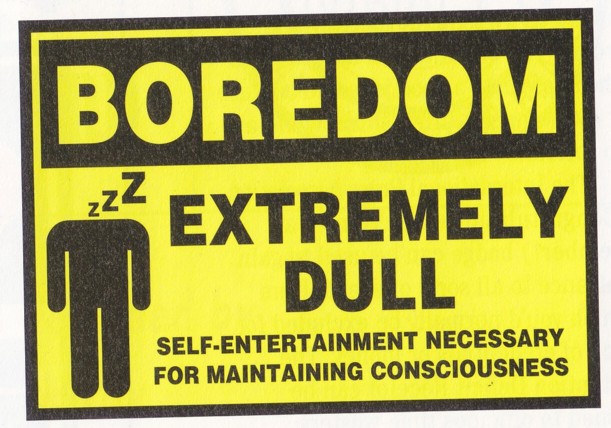 I’m not a great meetings person. I just generally find them tedious. I lose concentration easily, I get distracted, I end up thinking about a whole lot of things that maybe I shouldn’t be thinking about or eat far too many biscuits and then feel bloated and guilty at the same time! Meetings and me don’t really mix….but I have to go to a lot of them, in fact, I now have to chair many of them and so I’ve been on a bit of a journey about how meetings can be made better.
I’m not a great meetings person. I just generally find them tedious. I lose concentration easily, I get distracted, I end up thinking about a whole lot of things that maybe I shouldn’t be thinking about or eat far too many biscuits and then feel bloated and guilty at the same time! Meetings and me don’t really mix….but I have to go to a lot of them, in fact, I now have to chair many of them and so I’ve been on a bit of a journey about how meetings can be made better.
My main beef with them, it turns out as I’ve reflected on why I dislike them quite so much,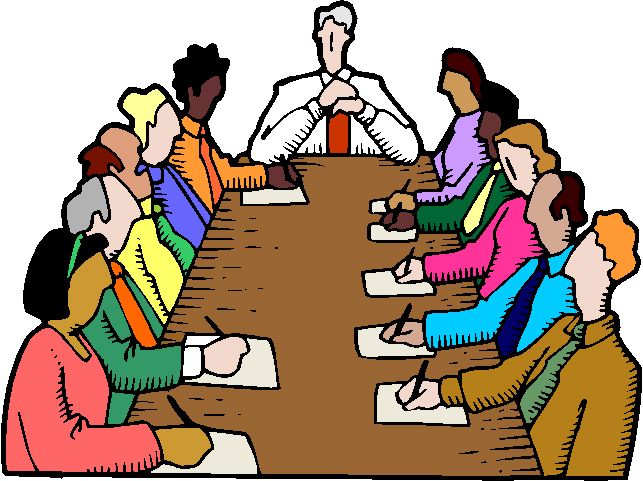 is not that they don’t achieve anything. Nor is it that I’m involved in conversations I don’t care about – actually I don’t go to any meetings in which I don’t deeply care about the things being discussed. So what is my problem? My problem is that meetings, and I don’t think this is unique to the NHS (but this is where most of my meetings take place), are so often devoid of any real human connection. They lack care for those attending the meetings. It’s so easy to get so focussed on the stuff, the business, the discussions, the problems, that we forget that there are other human beings in the room, each of whom arrive in the room (or virtual space) with many different emotions, stories, dreams and realities that may be really important, but we don’t know because we don’t give space to those things.
is not that they don’t achieve anything. Nor is it that I’m involved in conversations I don’t care about – actually I don’t go to any meetings in which I don’t deeply care about the things being discussed. So what is my problem? My problem is that meetings, and I don’t think this is unique to the NHS (but this is where most of my meetings take place), are so often devoid of any real human connection. They lack care for those attending the meetings. It’s so easy to get so focussed on the stuff, the business, the discussions, the problems, that we forget that there are other human beings in the room, each of whom arrive in the room (or virtual space) with many different emotions, stories, dreams and realities that may be really important, but we don’t know because we don’t give space to those things.
So, as I believe culture change has to start with me and the teams I work with, I am trying, somewhat awkwardly at times, to have different kinds of meetings! When I chair, I refuse to let us get on with ‘business’, until we have taken time to connect with each other. Using 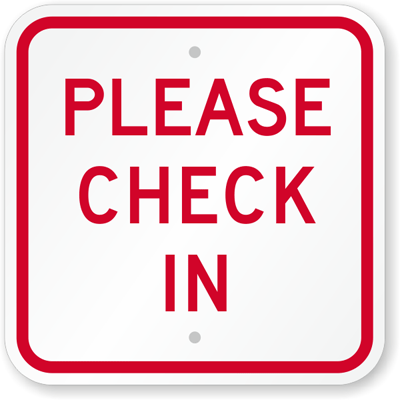 a simple technique from the ‘art of hosting’ I give space for a ‘check-in’. A check in is really simple, it’s just what it says on the tin. There are usually 2 questions and they can vary from meeting to meeting. Often, I just ask: How are you? And what do you love about your job? It is so important to know how each other is doing, so we can create teams that care for each other. People don’t have to be honest, but when they choose to be vulnerable, it opens up a space that is incredible and invites the entire team to go a bit deeper. And giving space for people to focus on the positive aspects of their work automatically changes the dynamic of any meeting from the start. Another of my favourite questions is: What do you love about working with the person on your left? (And if there’s time another round of ‘And what else do you love about working with the person on your left?). It is so healthy for a team to learn to appreciate one another but more than that, to actually tell each other that they are valued. You can get to know one another over a period of just a few weeks so much more and you end up actually caring about one another’s lives and wellbeing.
a simple technique from the ‘art of hosting’ I give space for a ‘check-in’. A check in is really simple, it’s just what it says on the tin. There are usually 2 questions and they can vary from meeting to meeting. Often, I just ask: How are you? And what do you love about your job? It is so important to know how each other is doing, so we can create teams that care for each other. People don’t have to be honest, but when they choose to be vulnerable, it opens up a space that is incredible and invites the entire team to go a bit deeper. And giving space for people to focus on the positive aspects of their work automatically changes the dynamic of any meeting from the start. Another of my favourite questions is: What do you love about working with the person on your left? (And if there’s time another round of ‘And what else do you love about working with the person on your left?). It is so healthy for a team to learn to appreciate one another but more than that, to actually tell each other that they are valued. You can get to know one another over a period of just a few weeks so much more and you end up actually caring about one another’s lives and wellbeing.
Secondly, I learnt a trick from a great friend of mine, who recently finished an MSc at the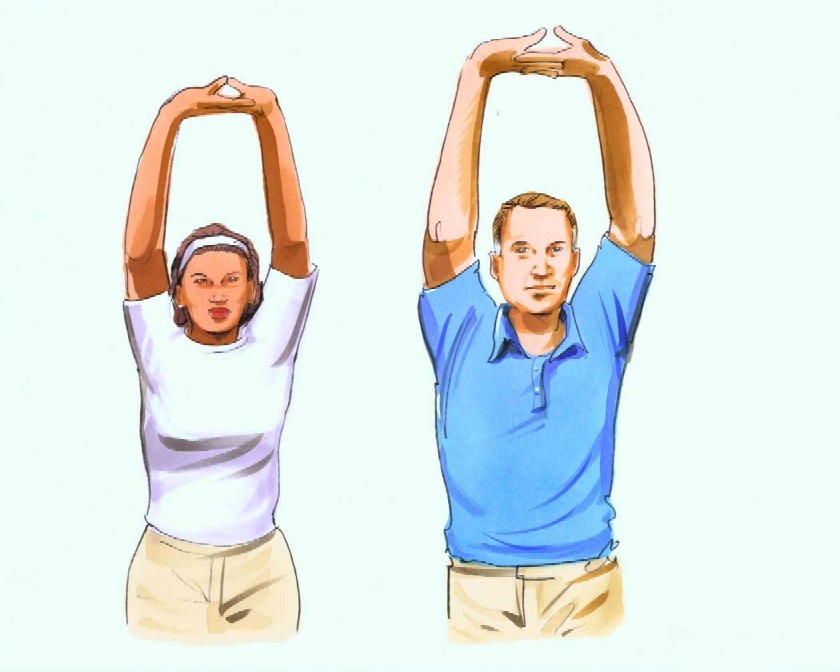 University of East London. In the department of positive psychology there, a bell goes every 25 minutes of a lecture and everybody stands up and has a stretch. Research clearly shows, we don’t concentrate for any more than 25 minutes. And so now, in my meetings, every 25 minutes, my alarm goes off and we all stand up and stretch and get the blood flowing round our bodies. We’ve become so conditioned, like Pavlov’s dogs, that if anyone’s phone goes we all start to stand and stretch! Plus, it is great for low back pain!
University of East London. In the department of positive psychology there, a bell goes every 25 minutes of a lecture and everybody stands up and has a stretch. Research clearly shows, we don’t concentrate for any more than 25 minutes. And so now, in my meetings, every 25 minutes, my alarm goes off and we all stand up and stretch and get the blood flowing round our bodies. We’ve become so conditioned, like Pavlov’s dogs, that if anyone’s phone goes we all start to stand and stretch! Plus, it is great for low back pain!
The other thing, I have introduced is 2 minutes of meditation/mindfulness at the start or 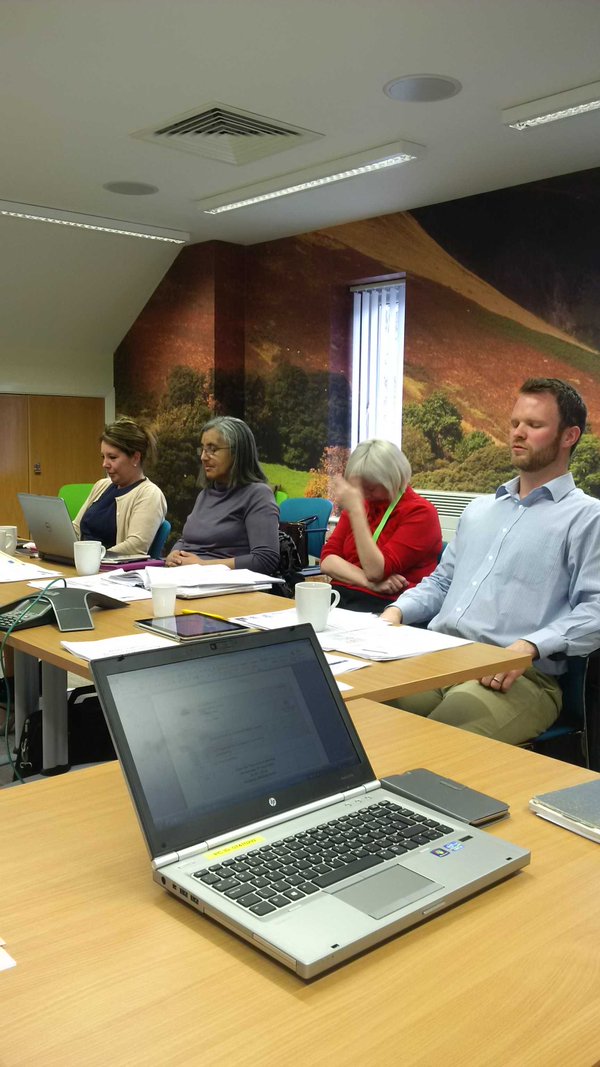 in the middle of a meeting. Using a very simple technique, I encourage everyone to find a comfortable sitting position. We then breathe in through our noses for the count of 4, deliberately breathing a sense of hope, peace, love and gratitude. We then hold this and hold our breath for the count of 8 (people count at their own pace) and then breathe out to through our mouths for the count of 8. When we breathe out, we deliberately breathe out stress, bitterness, anger, distraction, or anything that stops us being able to connect. And then we continue. The first few times I tried this, we had some giggling (mainly from me), photos being posted on twitter (!) and general weird feelings…..but we have pushed through and it’s amazing how good it feels to just stop and be and let the busyness just wash over us for a couple of minutes.
in the middle of a meeting. Using a very simple technique, I encourage everyone to find a comfortable sitting position. We then breathe in through our noses for the count of 4, deliberately breathing a sense of hope, peace, love and gratitude. We then hold this and hold our breath for the count of 8 (people count at their own pace) and then breathe out to through our mouths for the count of 8. When we breathe out, we deliberately breathe out stress, bitterness, anger, distraction, or anything that stops us being able to connect. And then we continue. The first few times I tried this, we had some giggling (mainly from me), photos being posted on twitter (!) and general weird feelings…..but we have pushed through and it’s amazing how good it feels to just stop and be and let the busyness just wash over us for a couple of minutes.
I can hardly say the above is a revolution, but I can say that I genuinely enjoy the meetings now. I know my teams better, I am more connected to those I work with and I am more able to focus. Connecting, stretching and some time to be still……it’s exactly the medicine that NHS teams need right now, and probably a whole bunch of other organisations also!


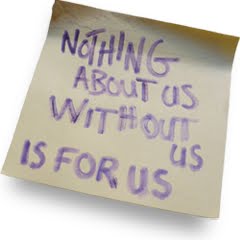
 een willing to be humble and be impacted by these stories. I am grateful for relationships and partnerships that are being established between those of us who provide services and those who use them. I am grateful for the tenacity of people who want to see our cultures change. I am grateful for ‘The Leeds Poverty Truth Challenge’ and its far reaching consequences. I am grateful for the opportunity to break down barriers and find positive ways forward. I am grateful for the transformative power of listening and the change that can happen when we really encounter another human being. Better Care Together is so much better when we work together with those we are trying to serve.
een willing to be humble and be impacted by these stories. I am grateful for relationships and partnerships that are being established between those of us who provide services and those who use them. I am grateful for the tenacity of people who want to see our cultures change. I am grateful for ‘The Leeds Poverty Truth Challenge’ and its far reaching consequences. I am grateful for the opportunity to break down barriers and find positive ways forward. I am grateful for the transformative power of listening and the change that can happen when we really encounter another human being. Better Care Together is so much better when we work together with those we are trying to serve.![tn_TreeRoots_resized_b-300x300[1]](http://reimagininghealth.com/wp-content/uploads/2016/03/tn_TreeRoots_resized_b-300x3001.jpg)
![Stack-of-British-one-pound-coins-1516897[1]](http://reimagininghealth.com/wp-content/uploads/2016/03/Stack-of-British-one-pound-coins-15168971.jpg)
![il_340x270.575369125_lhd6[1]](http://reimagininghealth.com/wp-content/uploads/2016/03/il_340x270.575369125_lhd61.jpg)
![image[1]](http://reimagininghealth.com/wp-content/uploads/2016/03/image1.jpg)
![781-T[2]](http://reimagininghealth.com/wp-content/uploads/2016/03/781-T2.jpg)
 Amidst the current ‘efficiency savings’, or cuts by any other name, in the NHS, the voluntary or 3rd sector, including the faith communities are an absolutely vital partner in health and social care. Here in Morecambe Bay, we are seeing incredible work done by this sector. Genuinely, the safety net created across this Bay for people with significant mental health issues, chronic physical health complaints, those at the end of life, the isolated and lonely etc is amazing. However, as the financial squeeze increases on the NHS, the 3rd sector, although phenomenally resilient and full of social entrepreneurs with good heart, is really beginning to struggle to secure funding. If the 3rd sector, (which gives far more for far less) begins to crumble, then we will see health and social care completely collapse.
Amidst the current ‘efficiency savings’, or cuts by any other name, in the NHS, the voluntary or 3rd sector, including the faith communities are an absolutely vital partner in health and social care. Here in Morecambe Bay, we are seeing incredible work done by this sector. Genuinely, the safety net created across this Bay for people with significant mental health issues, chronic physical health complaints, those at the end of life, the isolated and lonely etc is amazing. However, as the financial squeeze increases on the NHS, the 3rd sector, although phenomenally resilient and full of social entrepreneurs with good heart, is really beginning to struggle to secure funding. If the 3rd sector, (which gives far more for far less) begins to crumble, then we will see health and social care completely collapse. A second solution could be for the 3rd Sector to form one or several larger co-operatives. The huge advantage here is that it would then allow a more straight forward commissioning relationship and would allow the many to be become stronger and more resilient together. In a co-operative model, it would be easier to build research partnerships and accountability between members. It would also give the sector more clout as a partner round the table with the various public sector organisations.
A second solution could be for the 3rd Sector to form one or several larger co-operatives. The huge advantage here is that it would then allow a more straight forward commissioning relationship and would allow the many to be become stronger and more resilient together. In a co-operative model, it would be easier to build research partnerships and accountability between members. It would also give the sector more clout as a partner round the table with the various public sector organisations. If you take the work of Steve Peters (of “The Chimp Paradox” fame) seriously, which I do, then you can see Chimps at work everywhere in the NHS right now (and I’m not taking a cheap shot at Jeremy Hunt). For those of you, who have no idea what I’m talking about, then do read the book….but a brief precis is this: each of us are two people – we are both simultaneously an emotionally driven, primal chimp and a more rational human being. When faced with difficult circumstances, our chimps all too easily take over and our behaviour is driven by our emotions, because our human also feels insecure and we lose hold of our values (the computer part of our brains) which is able to alter our chimp behaviour.
If you take the work of Steve Peters (of “The Chimp Paradox” fame) seriously, which I do, then you can see Chimps at work everywhere in the NHS right now (and I’m not taking a cheap shot at Jeremy Hunt). For those of you, who have no idea what I’m talking about, then do read the book….but a brief precis is this: each of us are two people – we are both simultaneously an emotionally driven, primal chimp and a more rational human being. When faced with difficult circumstances, our chimps all too easily take over and our behaviour is driven by our emotions, because our human also feels insecure and we lose hold of our values (the computer part of our brains) which is able to alter our chimp behaviour. feel about what is happening in General Practice, Community Nursing/Therapy and indeed the NHS at large and it becomes easy to function out of raw emotion, heading into ‘rant mode’ or a strong defensive posture with the rest of my pride. But I have found it brings division. It pits my practice against another or General Practice at scale against the Hospital Trust or the government or whoever. But it doesn’t actually solve anything. It stares the problem in the face and hollers at it or throws faeces at it, and other than being cathartic (which has it’s place for a while), it doesn’t engage with a creative or collaborative process about how we face the future. The facts are right in front of us, and there is some thought about how to make General Practice strong enough to survive, be that through giant mergers or the formation of federations. Here in Morecambe Bay, we are experimenting with both those options and also trying to work in Integrated Care Communities (incorporating all our community partners) according to geographical locations.
feel about what is happening in General Practice, Community Nursing/Therapy and indeed the NHS at large and it becomes easy to function out of raw emotion, heading into ‘rant mode’ or a strong defensive posture with the rest of my pride. But I have found it brings division. It pits my practice against another or General Practice at scale against the Hospital Trust or the government or whoever. But it doesn’t actually solve anything. It stares the problem in the face and hollers at it or throws faeces at it, and other than being cathartic (which has it’s place for a while), it doesn’t engage with a creative or collaborative process about how we face the future. The facts are right in front of us, and there is some thought about how to make General Practice strong enough to survive, be that through giant mergers or the formation of federations. Here in Morecambe Bay, we are experimenting with both those options and also trying to work in Integrated Care Communities (incorporating all our community partners) according to geographical locations. If we are going to find solutions to the needs of the people we serve and develop together (no matter what is being shaped from the centre) a future healthcare model that works, GPs may need to let go of our power, as we have known it and embrace a different way of being. I think a possible solution lies with the co-operative movement as this would allow a truly integrative model to develop that benefits all our workers, no matter what their role, giving us the cultural environment in which innovation, excellence, learning, creativity and compassion could really flourish. Due to the nature of co-operatives and the principles at their core, a powerful force could be released which provides alternative solutions for a more equitable society.
If we are going to find solutions to the needs of the people we serve and develop together (no matter what is being shaped from the centre) a future healthcare model that works, GPs may need to let go of our power, as we have known it and embrace a different way of being. I think a possible solution lies with the co-operative movement as this would allow a truly integrative model to develop that benefits all our workers, no matter what their role, giving us the cultural environment in which innovation, excellence, learning, creativity and compassion could really flourish. Due to the nature of co-operatives and the principles at their core, a powerful force could be released which provides alternative solutions for a more equitable society. styles, from John Lewis to Mondragon, or the model adopted by Jos de Blok in the Netherlands. But the reason I like it so much, is that it takes power from the few and shares it with the many. It allows for a different style of leadership and a different mode of making decisions. Collaborative conversations and compassionate care of one another in providing care to the wider community becomes the order of the day with leadership that is both clinical and managerial but modeled on financial benefits for everybody and cooperation of wider teams of people.
styles, from John Lewis to Mondragon, or the model adopted by Jos de Blok in the Netherlands. But the reason I like it so much, is that it takes power from the few and shares it with the many. It allows for a different style of leadership and a different mode of making decisions. Collaborative conversations and compassionate care of one another in providing care to the wider community becomes the order of the day with leadership that is both clinical and managerial but modeled on financial benefits for everybody and cooperation of wider teams of people. There are draw backs and co-operatives are not perfect, but they are a solution that should be seriously considered as General Practice tries to navigate itself into the future. They can be complex to set up, but I would argue that complexity is worth it when it offers a solution that lasts longer than a more straight forward quick-fix that may not make it past a decade or two. Are we brave enough to explore solutions that dis-empower us for the sake of a better future for everyone?
There are draw backs and co-operatives are not perfect, but they are a solution that should be seriously considered as General Practice tries to navigate itself into the future. They can be complex to set up, but I would argue that complexity is worth it when it offers a solution that lasts longer than a more straight forward quick-fix that may not make it past a decade or two. Are we brave enough to explore solutions that dis-empower us for the sake of a better future for everyone?





 the Nation State is beginning to crumble all around us. Let me just repeat that difficult statement in another way. The grandfather that is the Nation State is now utterly riddled with a cancer and it is dying. The cancer, like all cancers needs ever increasing growth in order to sustain it’s life and our economy is set up to feed it, but even built on the pyramid of power, control and debt, it can no longer survive. Like any dying man, it is holding on for dear life and as it does so, it puts the squeeze ever tighter on to health, education and other public services, pretending it is still powerful, controlling public services through the slashing of budgets and ever tighter and undeliverable targets whilst not actually dealing with it’s debt issue at all, but telling us all a story that it is. And the mouth of
the Nation State is beginning to crumble all around us. Let me just repeat that difficult statement in another way. The grandfather that is the Nation State is now utterly riddled with a cancer and it is dying. The cancer, like all cancers needs ever increasing growth in order to sustain it’s life and our economy is set up to feed it, but even built on the pyramid of power, control and debt, it can no longer survive. Like any dying man, it is holding on for dear life and as it does so, it puts the squeeze ever tighter on to health, education and other public services, pretending it is still powerful, controlling public services through the slashing of budgets and ever tighter and undeliverable targets whilst not actually dealing with it’s debt issue at all, but telling us all a story that it is. And the mouth of 



 h and among the communities most affected. Leaders must learn to ‘hold the space open’ for the new to emerge. It will mean understanding that we must make choices about which targets we do and don’t decide to meet, prioritising some services over others and taking better care of ourselves individually and in community. But it is not a time to lose hope! There is much goodness to come, much rediscovering to take place. Much creative reimagining to enjoy. Many songs to be sung. So, let’s face the music and dance.
h and among the communities most affected. Leaders must learn to ‘hold the space open’ for the new to emerge. It will mean understanding that we must make choices about which targets we do and don’t decide to meet, prioritising some services over others and taking better care of ourselves individually and in community. But it is not a time to lose hope! There is much goodness to come, much rediscovering to take place. Much creative reimagining to enjoy. Many songs to be sung. So, let’s face the music and dance.